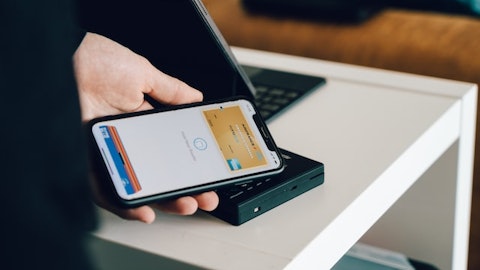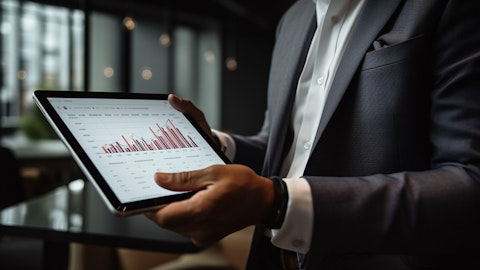Ning Tang: Thank you. Regarding the first question, because the first half of the year or first part of the year saw quite great business volume due to the fact that people were expecting the regulation change, so put it another way, most of the work of the year was done actually in the first part of it, so the second part, including fourth quarter, wasn’t great. But we expect that around middle of this year, things will stabilize and show new promise, and the market sentiment will be back. Mei can please provide more details regarding insurance?
Mei Zhao: Yes, yes. The fourth quarter, I think the whole market is under pressure on the regulatory impact, but I think although the impact, the players in the market have some sort of pause, but I think we are very confident because the need is there, just the market just needs some time to consume the impact. I think, just like Ning mentioned, for the new year, we can expect some new products, and also I think our customer, their needs, just because the whole market, the customer still has this kind of insurance demand, so I’m pretty much confident we have a rebound and we’re going to have some growth as well. Life insurance is a majority of our business, but still we can see a lot of demand from property insurance as well, such as employee or [indiscernible] insurance, so and so forth.
We can see the building demand, so I think for 2024, our insurance products, we’re going to have more property insurance as well, so I think that’s going to help us to more balance our insurance brokerage business as well. Thank you.
Keyao He: [Indiscernible] we have deployed US $1.9 million to buy back our shares in the public market, and then for the fourth quarter, the annual fourth quarter, the company has cumulatively deployed close to US $7.4 million for our repurchase program, and we will still do some buying back and we are very confident on our core strengths and future growth. Hope that answers your question.
Ning Tang: Yes, also we’ll do more share repurchase.
Bruce Oren: Thank you very much. Have a good evening.
Ning Tang: Thank you.
Operator: Your next question comes from Matthew Larson from Fincadia Capital. Please go ahead.
Matthew Larson: Thanks for taking my call, and congratulations on another really great year. I’ve been following your company since you went public through Morgan Stanley back in 2015, where I participated in your IPO. It’s nice to see the recovery in your business and the expansion. You know, the valuation is just really astounding. I mean, your company’s cash position is almost twice what your market capitalization is, and your earnings establish yourselves trading at just 1.5 times earnings, roughly, so if one just put a five multiple on that, you’re looking at a stock that could be $16 or $18. Some of your competitors do trade at that multiple. They also pay dividends, and that’s usually received well by investors here in the United States.
In fact, one competitor, Lufax, just announced today a $2.40 special dividend, and the stock is up dramatically. With all your cash, you’ve been buying back some shares, not a lot of them, though. The volumes picked up in the first quarter, which would allow you from volume restrictions to probably buy some more, and you’re trading well below book value, so I would recommend you perhaps institute a dividend but accelerate your buyback, because it’s totally accretive to you all. In addition, I like your guidance – it’s looking to be 20% to 40% greater for 2024 from 2023, and I think you should highlight that. You’re in a very strong growth pattern. Now, AI has been discussed a number of times on this call and in your news release, and I’m not sure the market really understands that you are a pioneering artificial intelligence investment opportunity, because you don’t put out many news releases, and in fact today’s just announced the earnings.
In my judgment, so that the investment buy side would understand your story better and give your company a higher valuation, would be to put out earnings–put out news releases that highlight your artificial intelligence capabilities. If for example you had put out that earnings for $3.29 helped by our artificial intelligence capabilities, that would highlight that you are an AI firm, and investors, certainly here in the United States, are hungry for exposure to the AI sector. If that is a possibility, I would recommend it because your company is not widely known because no analysts follow you, and you don’t do road shows and what have you, and it’s a smaller price stock. But now that you’re above $5, it puts you in a different arena, where investors that might have a minimum stock price to be able to employ their capital into your firm can do so.
I look forward to another great year. Thank you for the last one. Just if you could take some of my advice and consider it, I think it could be very helpful. Thanks for taking my call.
Ning Tang: Thank you. Thank you very much. Let me share my thoughts, then Mei can add to it. First of all, thank you very much for your long time trust. As we previously mentioned, we will continue to do share buybacks, but regarding dividends, it has been discussed and we’ve put some serious thought into it. As a matter of fact, we’ve done that before, so it’s not new to us, the concept and the practice, and we have also studied best practices around the world and in our peer group. The idea is that we believe we have great growth opportunities where we can deploy our capital rather than issuing a dividend. For example, our AI work has been done on a very low cost basis, because we want to be prudent, we want to be very careful.





